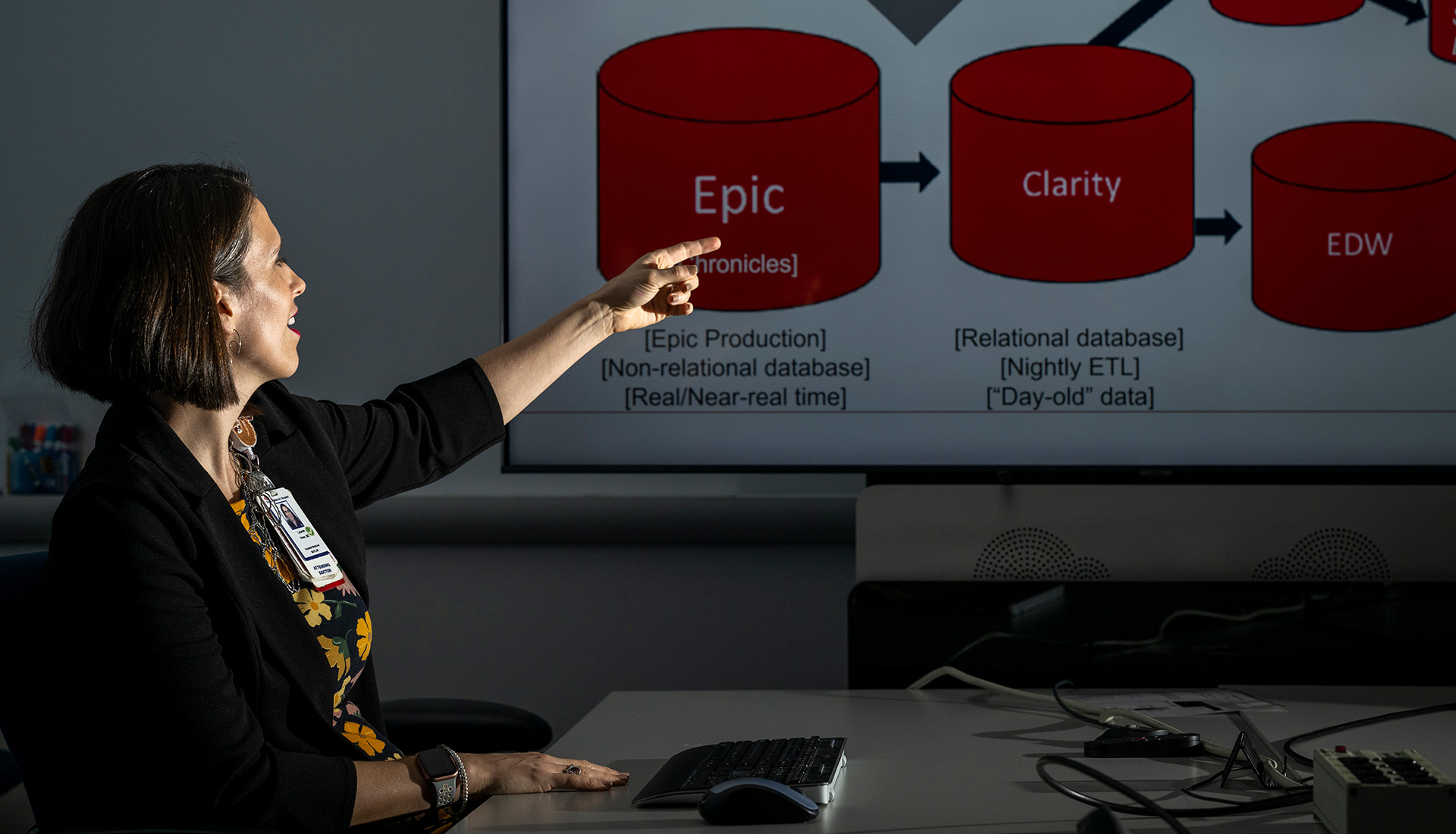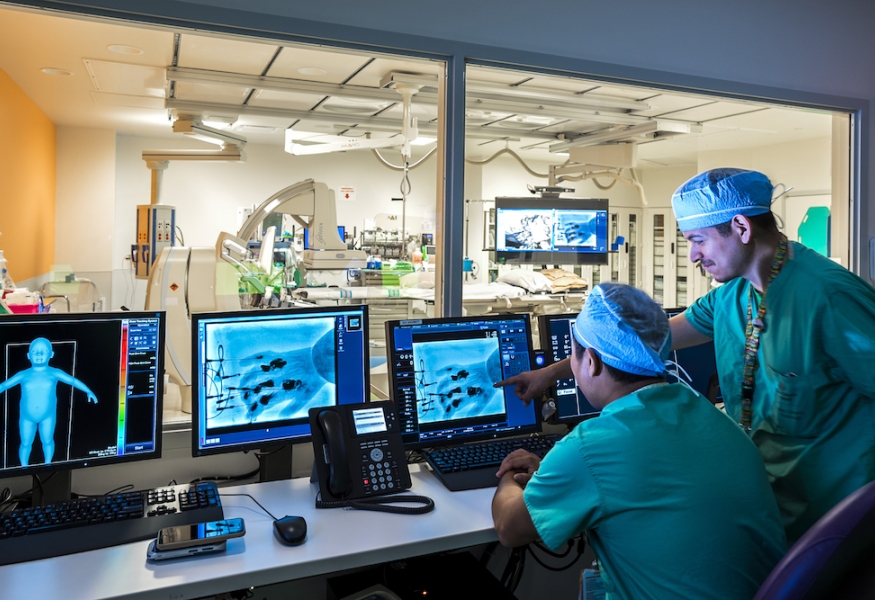

Clinicians are well suited to bridge the gap between health care practitioners and other spheres of expertise to enact meaningful technology changes within health care institutions.
After all, who knows better than a clinician where trends point in delivering patient care or understands more directly the pain points experienced by them and their colleagues during shifts? Who can best advocate on clinicians’ behalf to IT, institutional leadership and other stakeholders – and then, after interfacing with these parties and creating a solution, be able to translate IT concepts to other clinicians in a way that will resonate with them?
In carrying out this work, clinical informaticists grapple with critical questions such as:
Health care practitioners collect vast amounts of patient data to aid in diagnosing and treating patients. Texas Children’s Hospital has adopted a strategic effort to expand the impact of that data across the organization to improve patient care.
Texas Children’s Hospital has recently named two Associate Medical Information Officers from the Department of Pediatrics to lead work to better understand, organize and use data while ensuring the data is input into systems correctly. Their efforts are part of Texas Children’s program to harness the relatively new field of clinical informatics.
The board-certified clinical informaticists, Thomas Fogarty, MD, Pediatric Critical Care Specialist and Associate Chief Quality Officer for Pediatrics, and Lauren Hess, MD, Pediatric Hospitalist, share two goals:
Dr. Fogarty leads data governance and analytics efforts, while Dr. Hess leads data literacy and user engagement initiatives.
“Texas Children’s has incredible clinicians who depend on informaticists to help enhance their work through technology improvements and access to quality data,” Dr. Fogarty said. “I enjoy seeing other clinicians turn their insights into actions through data enablement. Informatics is exciting to me because of its scalability — the ability to empower everyone in the organization in a short period of time is amazing.”
Clinical informatics has emerged over the last decade at the nexus of health care and information technology (IT), data science, policy, finance and the work of other stakeholders across health care delivery systems. Clinical informaticists focus on collecting, analyzing and applying data toward care decisions and innovating technology advancements that benefit clinicians and patients alike.
Specifically, clinical informaticists merge clinical and technology perspectives to:
“In the short term, in partnership with our quality team, we have built an innovative data platform for physicians and nurses to leverage large amounts of data to drive quality improvement efforts through a common data structure and enhanced access,” Dr. Fogarty said. “This exploratory tool reduces the time needed to access data from months to hours and gives a comprehensive view of various patient populations. This transformational effort is designed to empower clinicians across the organization with data. We aim to act on insights rapidly to improve outcomes or reduce costs for our patients.”

Data access is critical to AI-enhanced patient care — as AI depends on accurate and actionable data to improve care. The in-depth experience of Dr. Fogarty and his team was instrumental in creating the AI-based Pediatric Deterioration Model. By collecting patient data at the bedside in regular wards and surfacing patterns in the data, the model identifies children at risk of being admitted to the intensive care unit so that proactive intervention can occur. This clinician-built model outperformed the standard AI model offered by Epic, the electronic medical record platform used at Texas Children’s. The Pediatric Deterioration Model is now undergoing evaluation for use across the hospital.
Just before the COVID-19 pandemic, Dr. Hess implemented a technology in Epic called Provider Teams in her Pediatric Hospitalist division — a relatively simple solution that has had a significant impact. It tags every clinician caring for a patient in Epic, in real time, so that their colleagues know whom to call at any moment in time if the need arises. The traditional approach had involved busy clinicians making multiple calls across the institution to determine who is caring for a patient, which can be a significant dissatisfier as well as potentially impacting quality of care through delays in access to the correct provider. After a successful pilot launch by Dr. Hess’ own division during the pandemic, the entire organization now uses Provider Teams.

One of Dr. Hess’ current initiatives stemmed from an Advanced Quality Improvement project that targets improvement of care for admitted patients with an aggressive behavioral health (BH) diagnosis by creating a BH-specific huddle tool. Within Epic, she built a multidisciplinary navigator that enables clinicians across disciplines — physicians, nurses, care managers and social workers — to collaborate and share vital information about patients, such as their type of aggressions, behavioral triggers, calming methods and medications. She then applied this work to create an Epic dashboard that provides a high-level view of where aggressive BH patients are in the hospital so that staff can allocate resources appropriately.
Dr. Hess has also been involved in creating a communications plan for the new Texas Children’s North Austin Campus. The hope is that instead of using desktops or multiple mobile devices, physicians and nurses will have a single personal mobile device that receives patient alerts within the Epic app. This will streamline clinicians’ devices, shorten response times and allow them to spend more time with patients at the bedside.
For innovations such as these, Texas Children’s is recognized for its successful deployment of health care information technology that meets the criteria of:
Texas Children’s Hospital is the only organization within the Texas Medical Center to receive all three Healthcare Information and Management Systems Society stage 7 designations — the highest recognition available — for Electronic Medical Record Adoption Model in:
Ten years ago, it would have been rare for hospitals to have clinical informaticists on faculty. Today, these professionals are increasingly common. Texas Children’s is in the middle of its journey of growing its clinical informatics division and becoming part of an elite tier of children’s hospitals with a mature, well-developed informatics group of at least 20 physicians, many of whom are in the Department of Pediatrics.
The growing team of faculty with training and certification in Clinical Informatics are working to educate the next generation of clinicians about this flourishing area of medicine by offering an elective in this specialty for pediatric residents at Baylor College of Medicine and a Clinical Informatics Fellowship for physicians seeking board certification in this discipline.
“It speaks highly of Texas Children’s leaders that they recognize the value in clinical informatics and are investing the dollars to support this initiative” Dr. Hess said.